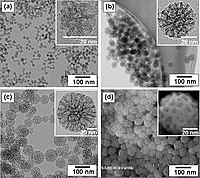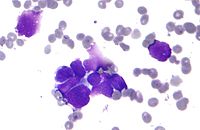
miR‐584‐5p regulates hepatocellular carcinoma cell migration and invasion through targeting KCNE2
Sign Up to like & getrecommendations! Published in 2019 at "Molecular Genetics & Genomic Medicine"
DOI: 10.1002/mgg3.702
Abstract: Hepatocellular carcinoma (HCC) is one of the most commonly diagnosed cancer type. This study was aimed to investigate the role of microRNA‐584‐5p (miR‐584‐5p) in regulating HCC progression. read more here.
Keywords: hepatocellular carcinoma; carcinoma cell; mir 584; 584 regulates ... See more keywords

MIR31HG exhibits oncogenic property and acts as a sponge for miR-361-3p in cervical carcinoma.
Sign Up to like & getrecommendations! Published in 2020 at "Biochemical and biophysical research communications"
DOI: 10.1016/j.bbrc.2020.06.028
Abstract: The long noncoding RNA (lncRNA) MIR31 Host Gene (MIR31HG) is a crucial regulator in malignant cancers. In this work, I examined the potential function and molecular mechanism of MIR31HG in cervical carcinoma progression. MIR31HG was… read more here.
Keywords: mir31hg exhibits; carcinoma cell; carcinoma; mir 361 ... See more keywords

Epigallocatechin-3-gallate Delivered in Nanoparticles Increases Cytotoxicity in Three Breast Carcinoma Cell Lines
Sign Up to like & getrecommendations! Published in 2022 at "ACS Omega"
DOI: 10.1021/acsomega.2c01829
Abstract: The anticancer activity of epigallocatechin-3-gallate (EGCG), orally administrated, is limited by poor bioavailability, absorption, and unpredictable distribution in human tissues. EGCG charged nanoparticles may represent an opportunity to overcome these limitations. We assayed two different… read more here.
Keywords: three breast; epigallocatechin gallate; carcinoma cell; breast carcinoma ... See more keywords

Bare plasmonic metal nanoparticles: synthesis, characterisation and in vitro toxicity assessment on a liver carcinoma cell line.
Sign Up to like & getrecommendations! Published in 2020 at "IET nanobiotechnology"
DOI: 10.1049/iet-nbt.2020.0097
Abstract: Metal nanoparticles have generated great interest due to their excellent optical and chemical properties. The widely used chemical method for synthesising nanoparticles involves capping agents for colloidal stability. However, there are scarce reports on the… read more here.
Keywords: carcinoma cell; metal nanoparticles; bare metal; metal ... See more keywords

Four new isoflavones from Derris scandens and their in vitro antiproliferative effects.
Sign Up to like & getrecommendations! Published in 2021 at "Natural product research"
DOI: 10.1080/14786419.2021.1888290
Abstract: Four new compounds (derriscandenon D (1), E (2), F (3), G (4)) and six known isoflavones (warangalone (5), millewanin E (6), rhynedlin A (7), 6,8-diprenylgenistein (8), isolupalbigenin (9), isoscandinone (10)) were isolated from the acetone… read more here.
Keywords: cell line; carcinoma cell; four new; derris scandens ... See more keywords

The beneficial effects of physical activity and weight loss on human colorectal carcinoma cell lines
Sign Up to like & getrecommendations! Published in 2020 at "Journal of Human Sport and Exercise"
DOI: 10.14198/jhse.2020.15.proc2.16
Abstract: Recent studies have demonstrated that obesity is a significant risk factor for the development of several malignancies such as cancer. Colorectal cancer is among the most common cancers worldwide and is strong linked to obesity.… read more here.
Keywords: carcinoma cell; weight loss; cancer; physical activity ... See more keywords

Tetrandrine Enhances Radiosensitization in Human Hepatocellular Carcinoma Cell Lines
Sign Up to like & getrecommendations! Published in 2018 at "Radiation Research"
DOI: 10.1667/rr14981.1
Abstract: The goal of this study was to determine whether tetrandrine enhanced radiosensitization in different hepatocellular carcinoma cell lines and to elucidate the potential mechanism. We also tested whether PA28γ was regulated by tetrandrine. The human… read more here.
Keywords: hepatocellular carcinoma; carcinoma cell; cell lines; dosage tetrandrine ... See more keywords

Telomere in colorectal cancer associated with distant metastases and predicted a poor prognosis
Sign Up to like & getrecommendations! Published in 2021 at "Translational Cancer Research"
DOI: 10.21037/tcr-20-3341
Abstract: Background Telomere is essential for chromosomal stability and its length has been proven to be related to prognosis in many malignant tumors. This study aims to investigate the relevance of telomere length with clinical and… read more here.
Keywords: cancer; distant metastases; cell; adenoma cells ... See more keywords

Downregulation of COPB2 by RNAi inhibits growth of human cholangiocellular carcinoma cells.
Sign Up to like & getrecommendations! Published in 2018 at "European review for medical and pharmacological sciences"
DOI: 10.26355/eurrev_201802_14380
Abstract: OBJECTIVE The present study aimed to explore the contribution of COPB2 (coatomer subunit beta) towards the tumorigenesis of cholangiocellular carcinomas and to elucidate the underlying mechanism(s). MATERIALS AND METHODS Expression of COPB2 mRNA by RBE… read more here.
Keywords: cholangiocellular carcinoma; carcinoma cell; copb2; rbe ... See more keywords

Harnessing Carcinoma Cell Plasticity Mediated by TGF-β Signaling
Sign Up to like & getrecommendations! Published in 2021 at "Cancers"
DOI: 10.3390/cancers13143397
Abstract: Simple Summary This review describes mechanisms driving epithelial plasticity in carcinoma mediated by transforming growth factor beta (TGF-β) signaling. Plasticity in carcinoma is frequently induced through epithelial–mesenchymal transition (EMT), an evolutionary conserved process in the… read more here.
Keywords: carcinoma; carcinoma cell; tgf signaling; cell plasticity ... See more keywords

Mechanism of cis-Nerolidol-Induced Bladder Carcinoma Cell Death
Sign Up to like & getrecommendations! Published in 2023 at "Cancers"
DOI: 10.3390/cancers15030981
Abstract: Simple Summary The aim of this study was to determine the antitumor activity of nerolidol, a naturally occurring sesquiterpene alcohol, in two bladder carcinoma cell lines and to elucidate the possible cell death pathway. Bladder… read more here.
Keywords: cell death; bladder carcinoma; cell; carcinoma cell ... See more keywords